Ontario’s local food report, 2023 edition
Learn about the people, businesses and organizations successfully working to strengthen Ontario’s local food economy.
Minister’s message
As Minister of Agriculture, Food and Rural Affairs I am pleased to recognize Local Food Week with the publication of the Local Food Report and take this opportunity to thank everyone who contributes to the strength of our local food supply.
Ontario’s agriculture and agri-food sector continually proves itself to be a cornerstone of our provincial economy. From innovative research that helps our famers and processors be more efficient and productive, to our commodity groups and distributors to retailers and restaurants — we are all working together to support growth and prosperity for this critical industry.
Local food in Ontario means something different to every person you ask, and we are lucky that across the province this industry encapsulates businesses of every size. The consistent piece being at every level Ontario food is a driving force in our economy, employing one in 10 people provincewide and contributing more than $47 billion in gross domestic product.
I appreciate the incredible dedication and commitment it takes to be a steward of the land — protecting our environment while caring for plants or livestock and ensuring that our businesses are growing and thriving. To ensure the industry has the tools it needs to grow, our government created the Grow Ontario Strategy. This strategy includes insight from stakeholders, the public and industry across the agri-food supply chain and sets strong and achievable goals that will build resiliency across the sector, help Ontarians develop new innovations and technology that support future growth and cultivate talent that will be skilled and trained to handle the exciting work ahead.
Whether we are building relationships and partnerships within the province, across the country or the world, amplifying Ontario’s local food industry is our goal. At the annual Food Summit, I heard many insightful and encouraging messages from stakeholders and businesses that we can and must increase our local food system’s capacity for production, people and technology to keep Ontario’s agri-food sector resilient and ready for the future needs of families, communities, the province and beyond.
This is the kind of collaboration and working together that makes Ontario’s agri-food sector an economic powerhouse.
Ontario’s food industry is strong and gaining momentum — and to me, that means great things can and will continue to grow in Ontario.
Lisa M. Thompson
Minister of Agriculture, Food and Rural Affairs
From farm to fork — the journey of Ontario food
Ontario is proud to be the food hub of Canada, and due to the diverse conditions across our province, there are more than 200 different kinds of food grown and produced within our borders. However, the journey of how food gets from the farm field to your table is critical to understanding how our agri-food sector has established itself as a cornerstone of our provincial economy. This video answers that question, and more about the importance of knowing how Ontario food makes its way from farm to fork.
Keeping Ontarians informed
For more than 45 years, Foodland Ontario has helped shoppers choose fresh food from close to home, all the while supporting Ontario farmers and businesses. With over 1,700 agri-food businesses proudly carrying the Foodland Ontario and Foodland Ontario Organics logos, it is easy to spot food from across the province in your neighborhood grocery stores.
Foodland Ontario produces an availability guide which breaks down by month which fruits and vegetables are in season and works with commodity organizations, general farm organizations and directly with retailers to promote Ontario food.
Watch this video to learn about the importance of supporting Ontario’s food industry.
In 2013, the Local Food Act was signed into law, and has three main purposes:
- foster successful and resilient local food economies and systems throughout Ontario
- increase awareness of local food in Ontario, including the diversity of local food
- encourage the development of new markets for local food
These three priorities also tie directly into the goals outlined in the government’s Grow Ontario Strategy. The Grow Ontario Strategy is the government’s plan to strengthen the agri-food sector, fuel economic growth, ensure an efficient, reliable and responsive food supply and address potential sector vulnerabilities through new innovations. It outlines actions to build consumer confidence, support farmers and processors, increase yields, promote Ontario-grown food, grow the agri-food talent pool and strengthen the supply chain.
Leading by example
Provincewide, Ontario has a diverse community that has built the foundation of our agri-food sector. This brings with it a wealth of talent and knowledge that is translated through our farmers, food processors and all across the value chain. The accomplishments can be seen in this year’s Local Food Report where examples of the outstanding work Ontarian’s are doing in our sector will be highlighted.
Barrie Hill Farms
Located in Springwater, Barrie Hill Farms began their business by growing tobacco in 1968. They later transitioned to strawberries in 1977, added blueberries, raspberries and asparagus in the mid-1980s. By the mid-1990s, the farm had added green and yellow beans, and peas. In the 2010s, they broadened their repertoire of offerings yet again with a picturesque apple orchard, which attracts tourists every fall.
As a second-generation family-owned and operated farm business, Barrie Hill Farms is an example of how expanding an operation into new markets can create a successful business model. As Barrie Hill Farms continues to expand their business to include aspects of agri-tourism with their apple orchard, they have taken it one step further and added a pick-your-own fruits and vegetables component. They’ve also added a market that sells fresh bakery treats featuring ingredients fresh from their farm, along with fresh food from local partner vendors.
To them, “looking to the future” means building a strong and vibrant farm business that can be passed down to future generations of the Gervais family.
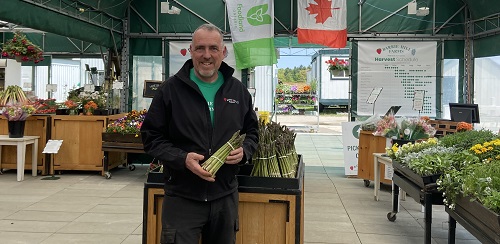
“Over the years, Foodland Ontario has been instrumental in growing our farm’s business,” said Morris Gervais, farmer and owner of Barrie Hill Farms. “Consumers recognize the logo and understand that it stands for freshness and the best that Ontario has to offer.”
The Honest Potato
The Honest Potato is taking a unique approach to potato farming in Ontario. This business is comprised of a collaborative effort between Downey Farms, Cohn Potato Processing, Fancy Pak, and their potato seed and breeding companies Progest and Sembec. The Honest Potato focuses on regenerative farming practices and places a strong emphasis on sustainability. They have zero organic waste and use compostable and recyclable packaging with 15% less paper than traditional paper-based bags.
These multi-generation and operated businesses work together to produce over 25 million pounds of “The Honest Potato.” This helps to keep 85% of their product for the fresh market, while the other 15% is processed.
The Honest Potato is also leading the way forward when it comes to innovation in the potato-growing industry. They have a breeding program that cultivates new varieties of potatoes that can grow in previously untapped areas of the province, as well as a seeding program that protects the integrity of those currently grown.

“You see a humble potato. We see endless possibilities to make the world a better place. The Honest Potato doesn’t just provide the best potatoes possible — we do it in a way that embraces regenerative agriculture and closed-loop farming, reduces food waste, encourages biodiversity and so much more,” said Trevor Downey, president of The Honest Potato Company. “Our potatoes not only reduce our carbon footprint — but hopefully, they will also inspire others to do the same.”
Successful collaborations that promote the consumption of local food across the province
The Government of Ontario works collaboratively with commodity and industry associations to promote the good things are grown and produced in Ontario. This drive supports the growth of the province’s agri-food sector, ensuring the sustainability of agriculture and fostering the growth and resiliency of our rural economies.
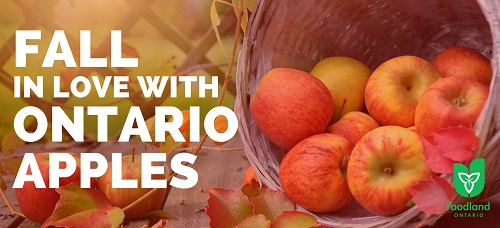
“Recent research has shown that Ontarians want to eat more local food, which means that as growers, we have a real opportunity to connect and engage with consumers about locally grown tree fruit,” says grower Cathy McKay, Chair of the Ontario Apple Growers. “We appreciate the support from the provincial government, which will help us make it easier for consumers to identify and purchase the healthy, nutritious tree fruit grown by farmers right here at home.”
In 2022, Ontario committed up to $200,000 to the Ontario Apple Growers and Ontario Tender Fruit Growers to market and promote fruits like apples, peaches, pears, nectarines, plums, apricots and tart red cherries. Through the various marketing activities led by these organizations with support from OMAFRA, it was possible to reach over 18,000,000 viewers and listeners across the province.
Supporting farmers and building agri-food tourism in communities across the province
Ontario’s agri-food industry continues to grow and develop new ways of doing business. According to Farm Fresh Ontario during the busy season, agri-tourism operators throughout the province are welcoming thousands of visitors on their farms. These diversified farms provide fun activities like pick-your-own, on-farm markets, bakeries, farm tours, and many other family friendly experiences.
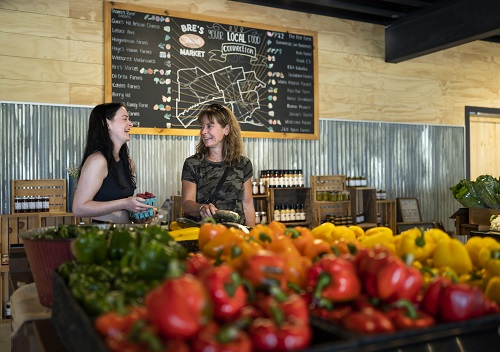
The popularity of food trails, food festivals, and Ontario farm-stays stand as a testament to that. People enjoy seeing where their food is coming from, interacting with the people behind it and experiencing the excitement of personally bringing food to fork. In turn, these types of events enable people from all communities to gather hands on experience and understanding of where their food is coming from, as well as the journey their food takes.
Opening access to local food
Having a great product, strong promotion and strategic distribution are the key ingredients to starting a food business. Once a business is established, ensuring they have the tools to grow and diversify is how the Ministry of Agriculture, Food and Rural Affairs can help. By creating the right conditions for businesses to grow and succeed, they will be able to develop new markets for Ontario products to strengthen our long-term economic outlook, provide good paying jobs that are close to home, and bring new investment opportunities to the province.
Watch this video featuring Shaw’s Ice Cream, Yorkshire Valley Farms, Donato’s Bakery, Vodkow, St-Albert Cheese Co-op Inc., Nerpy’s Inc. and County Fare as they share how they are growing their businesses with support from OMAFRA.
Sourcing local programs helps businesses grow
Each year, Metro grocery stores look to expand their Locally Sourced program in partnership with the Government of Ontario and other organizations across the province. Through business-to-business meetings, Metro establishes and maintains a close and collaborative relationship within the industry to promote local agri-food products in stores and increase access to these locally sourced products across seven different regions in Ontario. The program also provides local producers with invaluable business coaching opportunities, marketing support, listing opportunities and prominent in-store placement.
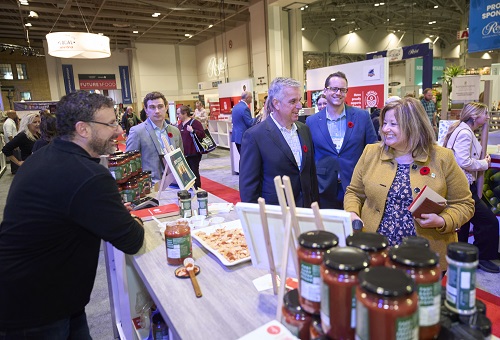
“Metro’s Locally Sourced program gives local entrepreneurs the opportunity and ability to offer, promote and showcase their great tasting products in Metro stores,” said Paul Grossi, senior director of meat and seafood merchandising, Metro Ontario. “Thanks to our incredibly dedicated local team and our partnership with OMAFRA, over 800 local products — from 150 local suppliers — are currently available at Metro stores across Ontario.”
To learn more about local producers, community events and partnerships, visit Metro’s Locally Sourced program page.
Expanding access to local food in the broader public sector
Broader public sector (BPS) organizations provide goods and services to Ontarians and contribute to the well-being of our local communities. As one of the goals of the Local Food Act, 2013, the Government of Ontario keeps exploring opportunities to clarify procurement in a way that respects trade rules while allowing organizations to increase the use of local food across the public sector.
This is what Ontario’s broader public sector looks like:
- 140 public hospitals
- 627 long-term care homes
- 23 universities
- 24 colleges
- 72 school boards
The benefits of increasing local across the broader public sector include:
- promoting the good things that are grown in Ontario
- creating jobs and economic growth in our communities
- building strong relationships with farmers and food businesses
Best practice strategies for BPS organizations to increase local food procurement include:
- research and procurement best practices
- conduct a food origin audit
- consult with customers and staff
- identify new opportunities with suppliers
- set goals for local food procurement
- track food purchases over time
- train food service staff to identify local products
- develop new menu items using Ontario foods
- make it easier to identify local on the menu
Ontario’s farmers work hard to produce food every day of the year. By offering more local food options, BPS organizations are contributing to the long-term sustainability of our food supply chain and making a positive impact on our province’s economy.
Expanding Ontario’s domestic market
Choosing Ontario foods extends beyond the grocery store and farmers’ markets. As Ontario’s food industry continues to expand into the broader public sector, Ontario food is increasingly available in long-term care facilities, hospitals, universities and colleges, and schools. For farmers and food processors, this means new growth opportunities for their businesses.
This video discusses the importance, and the impact of how purchasing and sourcing Ontario foods helps ensure the sustainability and success of our provincial food supply chain.
Local food success at the City of Thunder Bay
In a world where most institutions purchase almost all their food through multi-national distributors, the City of Thunder Bay began prioritizing buying local food from area farmers several years ago. By making this change, they have set a new standard for local vendor support and are helping increase the production of locally grown food to help boost their community’s economy.
One of the main champions in this initiative is Pioneer Ridge, the city’s 150-bed long-term care home. As a result of the Thunder Bay + Area Food Strategy, and under the leadership of former manager of supply management for the city, Dan Munshaw, and food services manager at the Pioneer Ridge long-term care centre, Chris Borutski, this long-term care home has significantly increased local food offerings on their senior’s menu. In 2022, it was estimated that Pioneer Ridge incorporated 27.5% of locally grown food into their menu, which equated to roughly $258,383 in local food vendor support.
Pioneer Ridge’s initiative also supports the government’s plan to enhance the quality of care and well-being of residents as part of the Fixing Long-Term Care Act, 2021 by improving the quality, flexibility and healthiness of food offerings.
The Thunder Bay and Area Food Strategy was created by a group of regional, municipal and organizational partners to facilitate the development of a healthy, sustainable and economically robust local food system. Since its inception in 2014, its members — alongside prominent stakeholders in the industry — have successfully addressed several challenges facing the agri-food ecosystem.
“At Pioneer Ridge, we have the ability to share our passion for local food with a variety of clientele including our residents, tenants at Supportive Housing, an attached childcare centre, Meals on Wheels and all of our city departments that we provide catering to. The impact and positive feedback of that has been tremendous,” said Chris Borutski, food services manager at Pioneer Ridge Long Term Care and Senior Services. “Our local vendors take great pride in knowing that their food is reaching all these groups as well.”
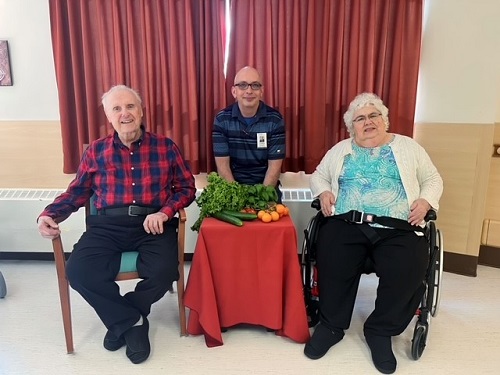
The city’s innovative forward-buying contracts with local food producers and Indigenous-led businesses (for example, fishers and harvesters) have been making a significant difference in northwestern Ontario.
As part of their commitment to increase local food produced and consumed in Thunder Bay and area, the city has recently launched an updated Community Food Security Report Card to facilitate the development of an equitable and sustainable food system. This report card, which tracks metrics related to local food data, will be used to gauge progress and identify areas for future improvement.
Looking ahead — the future of Ontario food
The future of Ontario’s agri-food industry is bright. Through the Grow Ontario Strategy, Ontario is collaborating with partners across industry, government and academia to increase resiliency across the food supply chain and further position the industry for success.
Here’s what you can expect in the upcoming years:
- Ontario is taking action to be a world leader in agri-food research and innovation. Watch this video to see how we are supporting cutting-edge research that will support farming processes, sustainability efforts and business profitability.
- The governments of Canada and Ontario are investing up to $6 million through the Sustainable Canadian Agricultural Partnership (Sustainable CAP) in a new Grow Ontario Market Initiative designed to help eligible agri-food businesses and industry organizations expand into domestic and foreign markets.
- One of the core goals outlined in the Grow Ontario Strategy is the attraction and development of a diverse and talented workforce. To support this endeavour, the governments of Canada and Ontario have committed up to $4 million into innovative pilot projects that will help agri-food businesses address specific labour needs through the Canadian Agricultural Partnership program.
The Government of Ontario is committed to creating the conditions that will facilitate growth and prosperity of our agri-food sector.